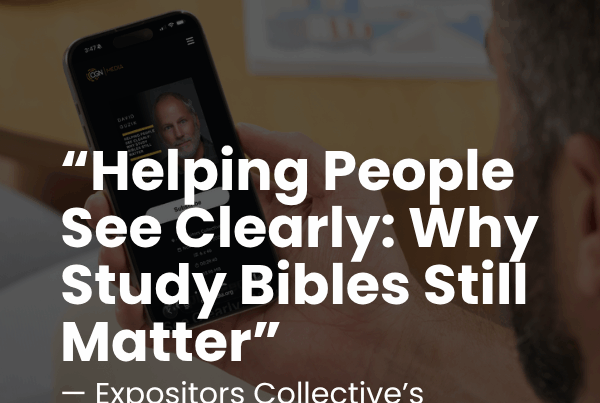
Paul AND Timothy. It is such a simple phrase — but it is loaded with the complicated and messy backstory of how the Gospel got to the readers of this letter in the first place. But here is the biggest thing about this phrase.
You will notice that in the title the little conjunction AND is in all-caps. That little word is a connecting word. Paul did not say, Paul, with Timothy. He intentionally said “Paul AND Timothy.”
Paul wants us to know that his life was connected to Timothy’s — and Timothy’s was connected to his.
Paul AND Timothy is one of the most important relationships in the whole of the Bible. Paul AND Timothy were central to the story of the Gospel breaking into Europe — which shaped the history of Western Civilization.
J. Sidlow Baxter in Explore the Book — AN IMMORTAL interest attaches to this little Philippian epistle, for it was sent to the first Christian church ever planted in Europe. Few events of history have had deeper or wider repercussions than the unostentatious visit of Paul and his few helpers to that colonial township of long ago.
Paul AND Timothy serve as the archetype of discipleship relationships. Paul’s investment into the life of Timothy shaped the history of the church in the 1st century.
PAUL AND TIMOTHY are really a part of OUR biographies! By way of their lives and the team around them, the Gospel reached Europe — and from Europe eventually reached us.
The team of PAUL AND TIMOTHY actually began with the break-up of PAUL AND BARNABAS, so turn left in your Bible and head back to Acts 15 and 16.
Acts 15:36 And after some days Paul said to Barnabas, “Let us return and visit the brothers in every city where we proclaimed the word of the Lord, and see how they are.”
Paul was not content to merely plant churches — he wanted to see how they were doing
Dave Guzik — Paul had the heart of both an obstetrician (bringing people into the body of Christ) and a pediatrician (growing people up in the body of Christ).
When Paul’s heart was burdened for those who had come to faith on that first missionary journey, Paul went straight to his good and godly great friend and co-worker Barnabas. There was no other name that came to mind; no other person he wanted by his side. They were serving Jesus together in the church in Antioch when in Acts 13 the Holy Spirit commissioned these men together, sent these men out together on the first intentional missionary outreach in the history of Christianity. They labored side by side for three years on that journey, and together they risked their lives for Jesus. God did radical things through this duo.
But check this out. These good men, these godly men, these great men who loved and respected each other, these men who had ventured everything on that three year mission trip — who agreed on so many things — and agreed on the importance of a second missionary trip, could not agree on who should be on the team this second time out.
37Now Barnabas wanted to take with them John called Mark. 38But Paul thought best not to take with them one who had withdrawn from them in Pamphylia and had not gone with them to the work. 39And there arose a sharp disagreement, so that they separated from each other.
These two men who were dedicated to seeking Gospel unity between Jews and Gentiles could not settle their own differences. This was no little disagreement. Luke (most likely by way of Paul) referred to it as a sharp disagreement. We get our English word paroxysm from this Greek word. It means a sudden attack or violent expression of a particular emotion or activity. In the medical world it is used to label a sudden recurrence or attack of a disease; a sudden worsening of symptoms.
Greek-English lexicon of the New Testament (BDAG) — a severe fit of a disease, attack of fever, esp. at its high point: convulsion
The tense of the verb tells us even more about the depth of this rift. The verb is in the imperfect tense which means a continuing quarrel— ongoing, heated, intense, deep disagreement between them.
Barnabas took Mark with him and sailed away to Cyprus, 40but Paul chose Silas and departed, having been commended by the brothers to the grace of the Lord.
This paroxysm provoked them to separate from each other. If this were in 21st century culture — this separation was way more than two people not texting one another, or de-friending the other person on Facebook. Barnabas grabbed John Mark, got on a boat, and sailed away!
The amazing relationship between Paul and Timothy — the relationship that was so crucial to the history of the church in the first century — the relationship that is the archetype of discipleship relationships — had its beginning with a broken relationship!
WHAT? How are we supposed to process that?
FIRST: Even the best of God’s men are yet men. You and I are what God has to work with.
SECOND: Kingdom work is work. Work involves workers. We do not want to miss that this blow up proves the truth of Proverbs 14:4:
Where there are no oxen, the manger is clean, but abundant crops come by the strength of the ox.
The big idea in the proverb is that if you were going to have abundant crops, you had to invest in oxen. The very nature of the beast guarantees the certainty of filthy, messy, stinky stalls. There is no such thing as a breed of oxen that does not poop. It is what they do by nature. Feed them and they poop.
The church needs to invest time and resources to have the workers for an abundant harvest. These men were resources in the Body of Christ. They were like oxen, paired by God. They invested three years of labor in the field, traveling great distances, facing radical opposition, risking their own lives. By the grace of God there was a great harvest of souls among the gentiles.
But — just as there is no such thing as a breed of oxen that does not poop, there is no such thing as a sinless Christian. Where there are oxen — where there are Christian workers — there are gonna be stinky messes! If you want to see an abundant harvest, but you are not up for the poop that comes with it, you are in the wrong business.
CHRISTIANS, there is no kingdom work without stinky messes! If there was a stinky mess in these two lives, there will be stinky messes in any work. If men as good and godly as these, great friends as these, can find their friendship and ministry relationship going into convulsions — who am I to think mine will not?
37Now Barnabas wanted to take with them John called Mark. 38But Paul thought best not to take with them one who had withdrawn from them in Pamphylia and had not gone with them to the work.
Barnabas was the encourager! His name means son of consolation. Barnabas encouraged and consoled Paul when the church in Jerusalem refused to believe Paul was saved. Barnabas was willing to step back and encourage Paul when it became clear that God was promoting Paul to be the leader of the first mission instead of himself.
But when Barnabas (whose name means son of consolation) broached the subject of John Mark joining the team again, both men boiled over — their friendship experienced a convulsion. A.T. Robertson says this:
“This “son of consolation” loses his temper in a dispute over his cousin and Paul uses sharp words towards his benefactor and friend.“1
There is no happy ending in this text. When they could not agree — only one solution was left: They split and went in separate directions.
39And there arose a sharp disagreement, so that they separated from each other.
separated = “to part asunder.” They were so angry that when they left, they did not just part company, their friendship was torn apart.
At this point, Barnabas literally sails off the pages of the Scriptures. He took John Mark and sailed west to Cypress, while Paul took Silas and went north into Asia Minor.
1Paul came also to Derbe and to Lystra.
Paul’s ended his first missionary journey in these cities about five years before the events of Acts 16. Paul was anxious to see for himself how the work of the Lord continued among these churches he founded five years before.
A disciple was there, named Timothy, the son of a Jewish woman who was a believer, but his father was a Greek.
Timothy is a Greek name, meaning “one who honors God.”2
Timothy must have been in his teens here in Acts 16. I say that because some twelve years after Acts 16, people disrespected, disregarded, and essentially discounted Timothy as a pastor because of his age.
1 Timothy 4:12 Let no one despise you for your youth, but set the believers an example in speech, in conduct, in love, in faith, in purity.
There are those who believe that Timothy is somewhere around the age of eighteen when we first meet him in Acts 16.3That means that Timothy came to faith in Jesus around the age of 13.
HUGE STUFF
In a big way we want to reach youth! Again — think of the violent opposition to Paul’s preaching in Lystra — where the Gospel was heard by a 13-year-old boy who not only got saved — but would become a vital part of how the Gospel would advance in the Book of Acts. We want to — we have to — reach out to teens in a big way (Monday nights, Jr. High and High School groups/camps, conferences).
We not only need to be big in our vision and in the scope of our ministry to young men and women — we need to live big for Jesus. As a 13-year-old, Timothy witnessed the brutal suffering Paul endured for the sake of Jesus in Lystra.
2 Timothy 3:10-11 You, however, have followed my teaching, my conduct, my aim in life, my faith, my patience, my love, my steadfastness,11 my persecutions and sufferings that happened to me at Antioch, at Iconium, and at Lystra—which persecutions I endured; yet from them all the Lord rescued me.
I believe Paul’s love of Jesus and love for the Gospel inspired this middle school-aged boy to serve so well at so young an age.
DO NOT MISS THIS
If we desire our churches to be Authentic, we must understand the importance of Paul to Timothy and the importance of Timothy to Paul in the advancing of the Gospel in the first century.
This young man would become very important in the life of Paul. We see just how important Timothy was to Paul from the way Paul regarded this young man. Here is the way Paul puts it:
1 Timothy 1:2 To Timothy, my true child in the faith:
Can you think of a more endearing or affectionate term to call anyone? Paul’s love for Timothy was a deep and strong and fatherly love.
Does this describe our heart for new believers?
To answer that question, think of what it was like when you brought your newborn child(ren) home from the hospital. Think about the countless pictures and videos that capture every possible “first” in your child’s life: First words, first steps, first burps, first …! Is that how we treasure and love new believers?
Do we yearn for new converts as some couples yearn to reproduce?
Paul, in a sense, had spiritually fathered this young man in his first missionary journey. Paul had reproduced his faith in Jesus. Sadly, most Christians are spiritually sterile. They have never been a part of seeing their faith in Jesus reproduced in others. Consider this: It has been estimated that in a six-month period, a pair of houseflies and their descendants would total 191,000,000,000,000,000,000 (191 quintillion) if all the offspring survived!4 One guy said that in just 3 months that would create a 46-foot high mound of flies big enough to cover Germany! The next time you swat a housefly, remember the importance of spiritual reproduction. PRAY for the Holy Spirit to direct you — enable — and empower you to lead others to tell others about Jesus
2He was well spoken of by the brothers at Lystra and Iconium.
FIRST: John Mark and Barnabas had just left Paul (Acts 15:36-41). But God did not leave Paul empty handed. There is a great lesson for us here: No single worker in God’s kingdom is irreplaceable. When a Barnabas or a John Mark leaves (for whatever reason), God has a “Timothy” to fill the void. In every area of life, God always has the right person ready at the right time, so be patient!
SECOND: Paul had learned a hard lesson along the way on his first missionary journey. He brought another young man (John Mark) on that trip because John Mark was related to Barnabas. That did not work out well at all. John Mark deserted them early on and his desertion ultimately led to a horrible division between Paul and his dear friend and co-laborer, Barnabas. Paul would not make the same mistake twice. He did not give up on young men being in ministry. He refined the process of including them. He essentially “vetted” Timothy before taking him on board his team.
Timothy had been serving the Lord for those five years in a way that left a tremendous impression on the believers.
Well spoken of = to confirm or attest something on the basis of personal knowledge or belief, bear witness, be a witness. to offer testimony5
The tense of the verb here means that people spoke well of Timothy again and again. Not just by family but by believers in two cities.
A.T. Robertson — Already he had so borne himself that his gifts and graces for the ministry were recognized. It is a wise precaution that the approval of the local church is necessary for the licensing and the ordaining of a preacher. If God has called a man for the work signs of it will be manifest to others.6
This relationship in Acts 16 sets the bar, establishes the template for enlisting men and women to ministry. There must be character, calling, and gifting that is observable over time and attested to by others!
3Paul wanted Timothy to accompany him,
Paul recognized that Timothy was an eager learner, a soft piece of clay ready to be shaped and molded into a minister of the Gospel. Paul sought him out and invited him to come along side of him in ministry. From that time forward, Paul saw Timothy as an important and integral part of his ministry. Seeing Timothy grow was Paul’s desire.
The New Testament tells us that Timothy played an important part in Paul’s ministry and the work of the Church in the first century. We find Timothy mentioned a number of times in the Book of Acts as well as in Romans and 1 and 2 Corinthians. Six of Paul’s epistles are addressed as being from Paul AND Timothy.
ADDITIONAL HUGE STUFF
Paul was not only taking Timothy as a helper on his next missionary journey, he was taking Timothy to invest in the future of his ministry and the continuation of the Authentic Mission of the church.
2 Timothy 2:1-2 1You then, my child, be strengthened by the grace that is in Christ Jesus, 2and what you have heard from me in the presence of many witnesses entrust to faithful men who will be able to teach others also.
Timothy’s growth meant growth for the Kingdom of God, growth for God’s people. Paul himself tells us just how much Timothy grew and as a result was able to expand and perpetuate Paul’s ministry.
Philippians 2:19-23 I hope in the Lord Jesus to send Timothy to you soon, so that I too may be cheered by news of you. 20For I have no one like him (KJV =likeminded), who will be genuinely concerned for your welfare. 21They all seek their own interests, not those of Jesus Christ. 22But you know Timothy’s proven worth, how as a son with a father he has served with me in the gospel. 23I hope therefore to send him just as soon as I see how it will go with me, 24and I trust in the Lord that shortly I myself will come also.
In other words, where I cannot be, I want Timothy to be there. My ministry, my heart for Jesus, my love for the flock of God, has been replicated in Timothy. When you get Timothy you’re getting me!
Paul did not see Timothy as a threat to his ministry. He saw him as the future of his ministry.
1 Corinthians 4:14-17 14I do not write these things to make you ashamed, but to admonish you as my beloved children. 15For though you have countless guides in Christ, you do not have many fathers. For I became your father in Christ Jesus through the gospel. 16I urge you, then, be imitators of me. 17That is why I sent you Timothy, my beloved and faithful child in the Lord, to remind you of my ways in Christ, as I teach them everywhere in every church.
Paul planted the church in Ephesus. But when God called Paul elsewhere, he turned it over to Timothy. The work which God began through Paul, continued through Timothy. Paul’s investment into the life of Timothy shaped the history of the church in the 1st century.
CONCLUSION
God is still continuing the work of advancing the Gospel in the same way in our generation.
Paul AND Timothy serve as the archetype of discipleship relationships.
They are organic — and they are relational. Without a doubt, Timothy sat as Paul proclaimed the Gospel and explained the Gospel in homes and in public gatherings.
2 Timothy 3:10 You, however, have followed my teaching
Today in the 21st century, that same relationship still exists and is crucial to the process of making disciples. The pastor teaches and shares from the Scriptures — and from his own walk with Jesus, truth that transforms — renews — encourages and equips believers. That truth leaves the building planted in the hearts of believers — and is then given away — just like Timothy did after he heard Paul teach and preach.
2 Timothy 2:2 and what you have heard from me in the presence of many witnesses entrust to faithful men who will be able to teach others also.
Then there were those moments when Timothy watched Paul’s life up close. Saw the truth of the Gospel lived out — applied in real life.
2 Timothy 3:10 You, however, have followed my teaching, my conduct, my aim in life, my faith, my patience, my love, my steadfastness,
God is still looking for Christians like Paul, men and women who will selflessly give away truth, give away the treasure of their own relationship with Jesus, the Timothy(s) God has set before them. God is still looking for Christians like Timothy — men and women who will humbly be taught — soaking up everything they can from godly individuals around them so that He can use them and send them.

God used the man in the yellow shirt and the man on the right like God used Paul in the life of Timothy. The man in the yellow shirt is Chuck Smith. He taught me the Bible — faithfully — cover to cover — and Jesus was in all of it. As he taught me the Bible, I fell in love with the Bible and more in love with Jesus. As he taught the Bible, I was filled with a deep desire to study the Bible. (Paul to Timothy: The things you heard me teach you in the company of others — you teach to others who will teach others.) As he taught me the Bible, I learned how to teach the Bible, how to think through passages and how to see a passage in relationship to the whole of the Bible.
The man on the right is Laverne Elwood Romaine. He NEVER let ANYONE call him that. He was simply Romaine — PERIOD! He taught me to live the word — trust in God’s word no matter how I felt or how things were going. He taught me to be a servant. He taught me what it was like to love others fearlessly — to not be afraid of what others might think about you or feel about you — to love them enough to tell them the truth. I learned that because THAT is how he loved me!
In one of my conversations in Dublin with Kellen Criswell back in 2018, I shared with him the profound effect Romaine had on my life — why he was such a profound influence. I got this the day after my conversation with Kellen while I was in the airport in Dublin — on my way to Scotland on route to Creation Fest.

THAT was the point of Paul’s relationship with Timothy.
THAT was the point of Chuck’s and Romaine’s relationship with me.
THAT is the point of Valerie’s and my relationship with our children.
THAT is the point of why we are here.
I am praying that by the grace of God and the power of the Holy Spirit THAT will be the point of your life!
References
1 Robertson, A. (1933). Word Pictures in the New Testament (Acts 15:39). Nashville, TN: Broadman Press.
2 Acts of the Apostles Vol. II. 1909 (H. D. M. Spence-Jones, Ed.). The Pulpit Commentary (27). London; New York: Funk & Wagnalls Company.
3 Robertson, A. (1933). Word Pictures in the New Testament (Ac 16:1). Nashville, TN: Broadman Press.
4 http://www.extension.purdue.edu/extmedia/FS/FS-22-W.pdf
5 Arndt, W., Danker, F. W., & Bauer, W. (2000). A Greek-English lexicon of the New Testament and other early Christian literature (3rd ed.) (617). Chicago: University of Chicago Press.
6 Robertson, A. (1933). Word Pictures in the New Testament (Ac 16:2). Nashville, TN: Broadman Press.







